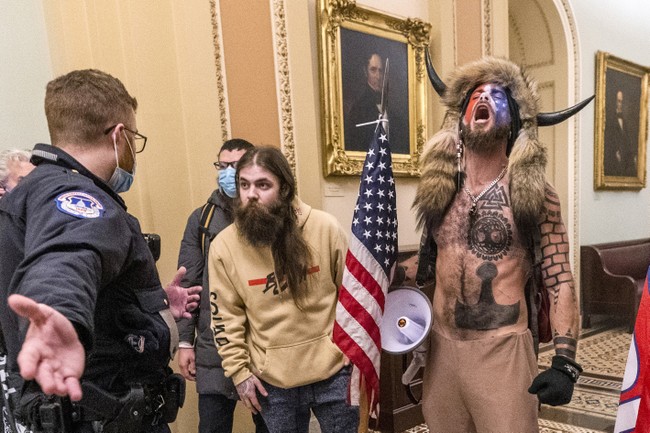Insistent claims to the contrary, the press in this country loves to slap labels on people and groups. This, despite years (generations?) of journos and pundits lecturing us against lumping people together in categories and assigning aspects to their character. To see how unable they are to adhere to their own dictates, we frequently see this amusing display when they criticize labeling people in a prejudiced fashion and, at the same time, imply that all Republicans behave in this manner.
It does not require mental strain to think up times the press resorts to this paint roller-style of labeling. We are too familiar with Republicans branded as Nazis, conservatives being fascists, any calm opposition to policy from a minority is due to racism, or any minor challenge to a female derived from sexism. To take a contrary stance toward trans individuals, Muslims, or other select groups leads to accusations where the suffix “-phobic” gets applied.
This lazy shorthand is also employed in another area. If an instance arises where a subject trends towards the conspiratorial, or people might be simply asking questions in a fashion that threatens to upset the accepted narrative, they are instantly dismissed as partaking in the “QAnon conspiracy.” This has become such a relied-upon trope in the press that they merely need to invoke the letter “Q” at times, and instantly they have framed the story.
In this amusing passage, @AP invokes its favorite smear that no one listens to, "Q-Anon", and then goes on to cite the heavily biased NewsGuard as a trusted source on "disinformation".
— Brad Slager: A Folksy Coach & Joyful As a K-Hive! (@MartiniShark) September 25, 2023
5/ pic.twitter.com/l7dmcgvq2J
Yet here is the very blatant and, at the same time, simple reality: Nobody in the press knows what the hell they are talking about when they invoke “Q.” It is simply a catchall accusation that, once applied, renders a target as no longer worthy of being regarded as serious. This is a deeply useful dose of partisanship for journalists, slapping this scarlet letter on a subject and instantly rendering their target as impotent and disregarded.
This technique cropped up again in a piece from the BBC, where they explore the conspiratorial minds pushing the theory that recent attempts on Donald Trump’s life have been staged affairs. The BBC takes a novel approach by finding crackpots from either side of the political scene, but even in this even-handed approach, you see a bias seeping in. These are the abbreviated profiles of the two women under focus who hold the belief of a staged plot, and it is clear how they are presented while positioned with political polarity:
About 70 miles north in the suburbs of Denver is Camille, a passionate supporter of racial and gender equality who lives with a gaggle of rescue dogs and has voted Democrat for the past 15 years.
Wild Mother - the online alias of a woman called Desirée - lives in the mountains of Colorado, where she posts videos to 80,000 followers about holistic wellness and bringing up her little girl. She wants Donald Trump to win the presidential election.
The Democrat, Camille, sounds almost rational as she is described as believing the plan to fake an attempted killing is to boost Trump’s favorability in the polls. Desirée, meanwhile, has succumbed to that pernicious movement. She is described as someone “who already follows QAnon, the unfounded conspiracy theory which claims Donald Trump is involved in a secret war against an elite cabal of Satan-worshipping paedophiles.”
Let me just say it prominently: The press LOVES the concept of QAnon. They dredge it up and toss the accusation around more freely than Trump flinging paper towel rolls in Puerto Rico. They do not love exploring the specifics of what makes this movement. What is QAnon, who is “Q,” and what is the purpose of this organized effort? These, and many more attached questions, will go completely unanswered by the media.
The press has spent years attempting to sell QAnon as a toxic mindset that has infected the Republican Party, both consuming political thought and driving policy in D.C. But there is a hilarious detail in this – the only source for most “Q” information is from the press itself. It seems odd that such a sprawling and all-consuming movement has no foundation or sourcing of its current beliefs, and odder still that the media are the ones with all of the supposed information.

This is not to say that QAnon was not once a viable entity. There was a time when postings with veiled predictions and coded messaging were being shared across the web. Individuals who attested to what things meant and foretold shared these widely. There had been talk that “Q” was someone highly placed in Trump’s government, or a top military official who leaked classified intel on the machinations inside the government.
Did you pick up on the use of the past tense in that paragraph? This is because the original website, formed in 2017, was banned from Reddit and moved to 4Chan, then to 8Chan, and has since been closed down. Years ago. The last posted message was in December 2020, but we are to believe QAnon is an ongoing and thriving entity.
There is no repository today where adherents can go and get the latest marching orders. We are to believe that QAnon has grown beyond its original intent into something even bigger today, which serves as a massive dose of convenience for the press; with no center of operations now, anything is attributable to QAnon, and as a result, anyone can be dubbed a follower. Since that label has built-in demonization, politicians or anybody else can become scorned.
But what of its origins – just who is/was “Q”? This is something else the press needs to avoid. Over the years two names have been pointed at as serving in the role of the eponymous letter, and neither is a person to be considered an important figure. In the HBO documentary “Q: Into The Storm,” they looked into the aspects of the “movement,” and at the end, had a revealing scene where the production team was speaking with a prominent participant, Ron Watkins, and he accidentally slipped up and seemed to reveal he was the then-current force of “Q.”
The New York Times also performed a search, employing linguistic forensics. Using two independent labs to analyze word stylings and other language markers, they tracked things down to Paul Furber. He was one of the original followers on the QAnon message boards and appears to have actually been the originator, eventually being overtaken by Watkins. So, who are these guys? They are not Washington players, nor are they military power brokers. Furber was a conspiracy investigator of sorts in South Africa, and website operator Watkins joined on months after QAnon became a known entity.
Neither man is a political insider with any pull or any true inside contacts. Yet this has not dissuaded the media from pushing the QAnon myth forward. Today, it is used much like how the story of Keyser Söze was in the film “The Usual Suspects” – a dire fairy tale once used to frighten children into behaving, but morphing into a convenient cipher that can be used to weave any tale out of convenience.
This is what our media complex has been reduced to: delivering fables as fact to contort narratives to their approved level. Notice that as QAnon is supposedly a conspiratorial sickness infecting all of conservatism, in order to learn anything new, we do not hear anything from conservatives, but instead, we hear it from the true passionate followers — the press.














Join the conversation as a VIP Member